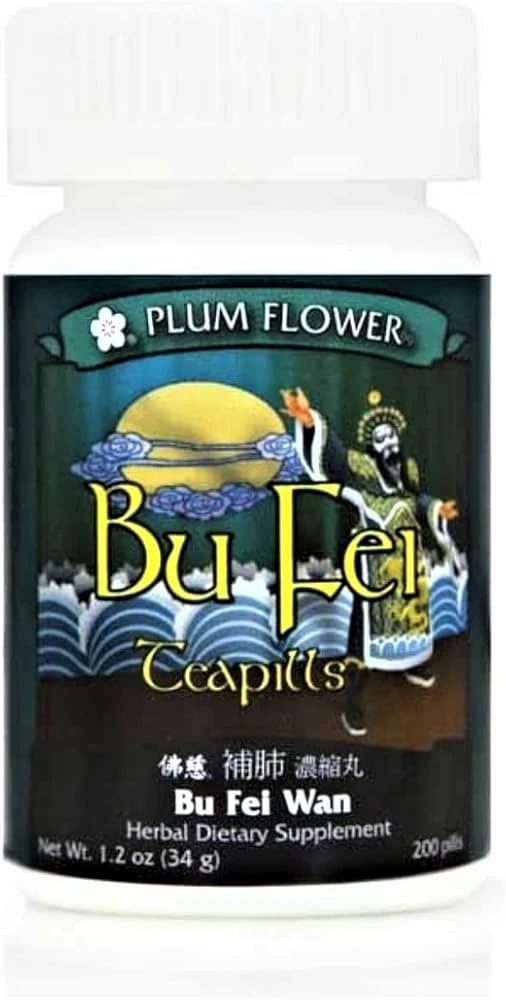Authored by Terrence Shenfield, MS, RRT-ACCS, RPFT, NPS, AE-C.
Living with Chronic Obstructive Pulmonary Disease (COPD) presents daily challenges, from shortness of breath to persistent coughing. While conventional medical treatments form the cornerstone of care, many individuals seek complementary approaches to support their respiratory health and improve their quality of life. One such approach gaining attention is the use of traditional herbal formulas. This article will explore the potential role of Plum Flower Bu Fei Teapills for COPD, delving into their traditional uses and how they might fit into a comprehensive management plan.
COPD is a progressive lung disease that makes it difficult to breathe. It encompasses conditions like emphysema and chronic bronchitis, primarily caused by long-term exposure to irritants such as tobacco smoke. Managing this condition involves a multi-faceted strategy, including medication, pulmonary rehabilitation, and lifestyle adjustments. In recent years, interest has grown in integrating herbal remedies for COPD management as a supportive measure. Among these, the traditional Chinese formula Bu Fei Tang, available in a convenient teapill form, stands out for its long history of use in nourishing the lungs.
We will examine the principles behind Bu Fei Teapills, the functions of their key ingredients, and the potential Bu Fei Teapills benefits for lung health. This information is intended to empower you with knowledge, helping you have more informed discussions with your healthcare provider about holistic approaches to your respiratory care.
Understanding COPD and Its Challenges
Before diving into herbal support, it is essential to understand the nature of COPD. This chronic inflammatory lung disease causes obstructed airflow from the lungs, leading to symptoms that can significantly impact daily activities. Key symptoms include:
- Dyspnea: Shortness of breath, especially during physical activity.
- Chronic Cough: Often called a "smoker's cough," which may produce mucus (sputum).
- Wheezing: A high-pitched whistling sound made while breathing.
- Chest Tightness: A feeling of pressure or constriction in the chest.
- Fatigue: A lack of energy that can be debilitating.
Conventional treatment for COPD aims to manage these symptoms, reduce the frequency of exacerbations (flare-ups), and improve overall quality of life. Standard treatments often include bronchodilators to open the airways, steroids to reduce inflammation, and oxygen therapy in advanced cases. While effective, these treatments are not a cure, and managing the condition is a lifelong commitment. This reality leads many to explore complementary therapies that can work alongside their prescribed medical regimen to provide additional support. For more information on respiratory conditions, explore our resources on respiratory health.
The Role of Traditional Chinese Medicine in Lung Health
Traditional Chinese Medicine (TCM) offers a different perspective on health and disease, viewing the body as an interconnected system where balance is key. In TCM, the Lungs (with a capital "L" to denote the organ system and its functions) are responsible for governing Qi (vital energy) and respiration. They control the circulation of Qi throughout the body and are considered a delicate organ, vulnerable to external factors like dryness, cold, and pathogens.
According to TCM principles, chronic respiratory conditions like COPD often stem from a deficiency in Lung Qi. This deficiency weakens the Lungs' ability to perform their functions, leading to symptoms like a weak cough, shortness of breath, and fatigue. The goal of TCM treatment is to tonify or strengthen the Lung Qi, clear any pathogenic factors, and restore balance to the system.
This is where herbal formulas like Bu Fei Tang come into play. The name "Bu Fei" translates to "Tonify the Lungs," which perfectly describes its primary purpose. By nourishing and strengthening the Lung organ system, the formula aims to address the root cause of the respiratory weakness, not just the symptoms.
An In-Depth Look at Plum Flower Bu Fei Teapills
Plum Flower is a trusted brand that produces high-quality versions of classic Chinese herbal formulas. Their Bu Fei Teapills are a convenient, concentrated form of the traditional Bu Fei Tang decoction. These small, round pills are easy to take and provide a standardized dose of the herbal blend, making it simpler to incorporate into a daily wellness routine.
The formula is specifically designed to address Lung Qi deficiency, which aligns with the presentation of many individuals with chronic respiratory issues. The potential Bu Fei Teapills benefits for lung health are derived from the synergistic action of its carefully selected ingredients. Let's explore the key herbs in this powerful formula and their traditional roles.
Key Ingredients and Their Functions
The effectiveness of Bu Fei Tang lies in its masterful combination of herbs, each with a specific role. The primary ingredient is Huang Qi (Astragalus Root).
- Huang Qi (Astragalus Root): This is the chief herb in the formula and a renowned Qi tonic in TCM. Huang Qi is known for its ability to strongly tonify the Lung Qi and Wei Qi (Defensive Qi), which is analogous to the immune system. By strengthening Wei Qi, it helps the body resist external pathogens that can trigger respiratory exacerbations. Its Lung-tonifying properties help improve respiratory function and alleviate fatigue.
- Ren Shen (Ginseng Root): Another powerful Qi tonic, Ren Shen powerfully strengthens the source Qi of the body. It specifically tonifies Lung and Spleen Qi. In cases of chronic illness, the body's overall energy is depleted. Ren Shen helps to rebuild this foundational energy, addressing the profound fatigue that often accompanies COPD.
- Shu Di Huang (Rehmannia Root, prepared): While the previous herbs tonify Qi, Shu Di Huang nourishes Yin and Blood. Chronic lung conditions can lead to Yin deficiency, characterized by symptoms like a dry cough or dryness in the mouth and throat. Shu Di Huang helps to moisten the Lungs and enrich the body's essential fluids.
- Wu Wei Zi (Schisandra Fruit): This unique herb is famous for its five flavors, and in TCM, it is used to restrain the leakage of Lung Qi. In practical terms, it helps to stop chronic coughing and wheezing. It also helps the Kidneys grasp the Qi, an important TCM concept for ensuring deep, full breaths.
- Zi Wan (Aster Root): This herb excels at relieving cough and expelling phlegm. It is particularly useful for chronic coughs, regardless of whether they are caused by heat or cold, according to TCM diagnostics.
- Sang Bai Pi (Mulberry Root Bark): Traditionally used to clear heat from the Lungs and stop wheezing. It directs Lung Qi downward, which helps to calm coughing and ease breathing.
Together, these herbs create a balanced and comprehensive formula. It doesn't just aim to stop a cough; it aims to rebuild the strength of the Lungs, enhance the body's defensive energy, moisten dryness, and calm the airways. This holistic approach is why many are turning to Plum Flower Bu Fei Teapills for COPD as part of an integrative care plan. If you are interested in trying this traditional formula, you can find Plum Flower Bu Fei Teapills here: https://amzn.to/4o1jJxq.
How Bu Fei Teapills May Support COPD Management
When considering herbal remedies for COPD management, it is crucial to think in terms of support, not replacement. Bu Fei Teapills can complement conventional treatments by addressing aspects of the condition that medications may not.
- Strengthening Respiratory Muscles and Reducing Fatigue: The Qi-tonifying properties of Huang Qi and Ren Shen are central to this formula. For someone with COPD, the simple act of breathing can be exhausting. By boosting the body's overall Qi and specifically the Lung Qi, this formula may help improve energy levels and reduce the sense of fatigue associated with labored breathing. This can lead to improved exercise tolerance and a better quality of life.
- Enhancing Immune Function (Wei Qi): People with COPD are particularly susceptible to respiratory infections, which can lead to severe exacerbations. Huang Qi is well-known for its ability to enhance the Wei Qi, or the body's first line of defense. A stronger defensive shield means the body may be better equipped to fend off viruses and bacteria, potentially reducing the frequency of infection-related flare-ups.
- Soothing the Airways and Reducing Cough: Chronic cough is a hallmark of COPD. The combination of herbs like Wu Wei Zi, which helps stop coughing, and Zi Wan, which expels phlegm, can help soothe irritated airways. By addressing both the cough reflex and the underlying phlegm, the formula may provide relief from this persistent and disruptive symptom.
- Moistening the Lungs: Some individuals with COPD experience a dry, non-productive cough and a feeling of dryness in the throat. This is where an herb like Shu Di Huang is beneficial. By nourishing Lung Yin, it helps to moisten the respiratory tract, making breathing more comfortable and soothing a dry cough.
Integrating this herbal support requires consistency. Teapills are typically taken several times a day, and it may take a few weeks to notice changes as the body's systems are gradually nourished and rebalanced. The convenience of Plum Flower Bu Fei Teapills, available at https://amzn.to/4o1jJxq, makes this consistent use easier to maintain.
Integrating Herbal Remedies Safely into Your COPD Plan
While the potential benefits are promising, it is imperative to approach the use of any herbal supplement with caution and proper guidance, especially when managing a serious condition like COPD.
Consult Your Healthcare Team
Before starting Plum Flower Bu Fei Teapills or any new supplement, the most critical step is to speak with your primary healthcare provider, pulmonologist, and a qualified TCM practitioner or herbalist. This is important for several reasons:
- Ensuring an Accurate Diagnosis: The effectiveness of a TCM formula depends on matching it to the correct underlying pattern. Bu Fei Tang is for Lung Qi deficiency. A qualified practitioner can confirm if this pattern matches your specific condition.
- Preventing Herb-Drug Interactions: Some herbs can interact with prescription medications. Your doctor and pharmacist need to be aware of everything you are taking to prevent adverse interactions. For example, some herbs may affect blood clotting or blood pressure, which could interact with related medications.
- Monitoring Your Progress: Your healthcare team can help you monitor your symptoms and lung function to assess whether the herbal formula is providing a benefit and to ensure your overall treatment plan remains effective.
Quality and Dosage Matter
When choosing an herbal product, quality is paramount. Opt for reputable brands like Plum Flower, which adhere to Good Manufacturing Practices (GMP). This ensures that the product is tested for contaminants and that the ingredients are authentic and potent.
Follow the dosage instructions on the product label or as directed by your TCM practitioner. Taking too little may not be effective, while taking too much could lead to unwanted side effects. Consistency is more important than high doses.
A Holistic Approach to Respiratory Health
Remember that herbal remedies for COPD management are just one piece of the puzzle. A truly holistic approach includes several key lifestyle components:
- Adherence to Medical Treatment: Never stop or alter your prescribed medications without consulting your doctor. Herbal remedies are meant to be supportive, not a substitute for your primary medical care.
- Pulmonary Rehabilitation: This program of exercise, education, and support is one of the most effective interventions for improving quality of life with COPD.
- Healthy Diet: A nutrient-rich diet can support your immune system and overall energy levels.
- Avoiding Irritants: The most important step is to avoid smoking and exposure to secondhand smoke, dust, and other air pollutants.
- Mind-Body Practices: Techniques like diaphragmatic breathing, pursed-lip breathing, yoga, and tai chi can help manage breathlessness and reduce stress.
For a deeper understanding of supportive care for respiratory conditions, ATECAM Health & Wellness offers a wealth of information on respiratory health.
Conclusion: A Supportive Path Forward
Living with COPD requires a proactive and comprehensive approach to health. While there is no magic bullet, integrating supportive therapies can make a meaningful difference in your day-to-day life. Plum Flower Bu Fei Teapills for COPD offer a time-tested method, rooted in the principles of Traditional Chinese Medicine, for nourishing the lungs and strengthening the body's vital energy.
By tonifying Lung Qi, enhancing defensive energy, and soothing the airways, this formula may help alleviate some of the most burdensome symptoms of COPD, such as fatigue and chronic cough. The potential Bu Fei Teapills benefits for lung health make it a compelling option for those seeking to broaden their wellness toolkit.
This journey should always be undertaken in partnership with your healthcare team. Open communication ensures your safety and the effectiveness of your integrated care plan. With careful consideration and professional guidance, traditional formulas like Bu Fei Teapills can become a valuable ally in your path toward better respiratory wellness. To explore this option further, you can find the product here: https://amzn.to/4o1jJxq.
ATECAM Health and Wellness participates in the Amazon Services LLC Associates Program, an affiliate advertising program designed to provide a means for sites to earn advertising fees by advertising and linking to Amazon products.
References:
- Chen, J. K., & Chen, T. T. (2004). Chinese Medical Herbology and Pharmacology. Art of Medicine Press.
- Maciocia, G. (2015). The Foundations of Chinese Medicine: A Comprehensive Text (3rd ed.). Elsevier.
- Bensky, D., Clavey, S., & Stöger, E. (2015). Chinese Herbal Medicine: Materia Medica (3rd ed.). Eastland Press.
- Liao, X., Wang, J., & Wang, Y. (2018). Traditional Chinese Medicine for Chronic Obstructive Pulmonary Disease. Springer.
- World Health Organization. (2023). Chronic obstructive pulmonary disease (COPD). WHO Fact Sheets.



